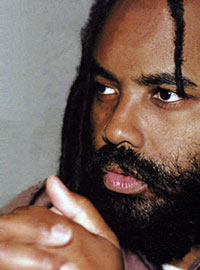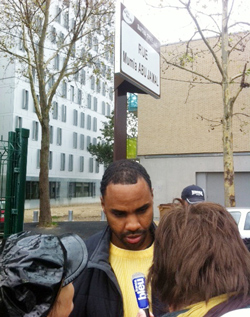French city stands-up for political prisoner Mumia Abu-Jamal
By Linn Washington, Jr. Special to The Final Call | Last updated: Nov 5, 2012 - 11:12:23 AMWhat's your opinion on this article?

|
The one block long Rue Mumia Abu-Jamal runs beside Le Conseil des Prud’ hommes, a court building in Bobigny, the most ethnically diverse city in France located six miles from the center of Paris.
The widely respected Abu-Jamal has spent over 30 years in Pennsylvania prisons because courts in America—state and federal—have consistently rejected both strong evidence of his innocence and egregious rights-robbing abuses against him by authorities from police to prosecutors to judges.
The mistreatment meted to Mr. Abu-Jamal by American courts is a reason why the United Nations, the European Union, Amnesty International and other entities have condemned the validity of his conviction for murdering a Philadelphia policeman in 1981.
And that mistreatment is a key reason why millions around the world consider Mr. Abu-Jamal a political prisoner.
“What is happening to Mumia Abu-Jamal is a blatant injustice,” Bobigny Mayor Catherine Peyge said during her remarks at the naming Oct. 13 ceremony for Rue Mumia Abu-Jamal.
“Bobigny is fighting for respect and justice for Abu-Jamal and others.”
That juxtaposition of street and labor law court building location was emphasized by one of the speakers participating in that naming ceremony attended by more than 100 people from France, the Caribbean and the Americas—North and South.

Mumia Abu-Jamal’s son Jamal Hart, speaks on street named for his father.
|
“It is poetic that this street is next to the building important to workers rights and labor issues. Mumia often speaks out on issues involving workers and exploitations by corporations,” said Johanna Fernandez, a university professor in America who produced the 2010 documentary film examining the Abu-Jamal case entitled “Justice on Trial.”
Mr. Abu-Jamal’s oldest son, Jamal Hart, was a featured speaker at the ceremony where his father delivered pre-recorded remarks in French, a language he learned while in prison.
“My father is elated by this action and he feels it across the waters,” Jamal said. Mr. Abu-Jamal’s removal from death row isolation enabled his son to hug him for the first time in three decades during a recent prison visit.
Mr. Abu-Jamal is now serving a life-without-parole sentence in Pennsylvania since his removal from death row in December 2011 resulting from federal courts eliminating his death sentence due to errors by the judge presiding at his 1982 trial.
That Bobigny street-naming, the second in a Paris suburb for Mr. Abu-Jamal, follows 10 years of efforts by officials in that city including the construction of a new street.
Rue Mumia intersects a major artery in Bobigny named after a famous French author/journalist from the early 20th Century.
Bobigny and Paris are among the number of city’s worldwide that have extended honorary citizen stature to Mr. Abu-Jamal who’s been incarcerated since his arrest on December 9, 1981.
Myriam Malsa, an environmental activist who attended the naming ceremony while visiting Paris on business, lives in Sainte-Anne, Martinique, a city that named Mr. Abu-Jamal an honorary citizen a dozen years ago.
That Bobigny street naming comes at a time of newly-expanded interest in Mr. Abu-Jamal.
This interest is corralling the hopes expressed by Philadelphia officials last December that Mr. Abu-Jamal’s removal from death row consigned him to rot in oblivion stripped of notoriety they perceived him receiving from his death row status.
A new documentary movie focusing on the “Who” of Abu-Jamal as a journalist/intellectual/activist versus the previous “Who Done It” crime examination focus of other films is circulating among film festivals worldwide.
“Long Distance Revolutionary: A Journey with Mumia Abu-Jamal” is scheduled for in-theater releases next February after selected screening like one in New York City on Nov. 10.
Also a new book—“Veronica & the Case of Mumia Abu-Jamal as told to her sister Valerie Jones”—reveals the untold story of the sexual relationship between the then married policeman Mr. Abu-Jamal was convicted of killing and a prostitute who later testified at Mr. Abu-Jamal’s 1982 trial.
Veronica Jones said she witnessed two men fleeing from the fatal shooting of Officer Daniel Faulkner. But intense pressure from Philadelphia police including threats of long incarceration forced Ms. Jones to deny her observation when she testified at Mr. Abu-Jamal’s trial.
Veronica Jones came forward in 1996 to recant her false trial testimony.
The effort by Ms. Jones to right a wrong subjected her to vicious abuses by Philadelphia prosecutors and Mr. Abu-Jamal’s trial judge that included a highly usual arrest of Ms. Jones on the witness stand immediately after her testimony for a minor check cashing charge that authorities had previously ignored.
Ms. Jones, who died in 2009, had always maintained that she knew Off. Faulkner and considered him a friend. She said her recantation was to clear her conscious not primarily to aid Mr. Abu-Jamal’s appeals.
That 1996 courtroom arrest incident involving Ms. Jones resurfaced recently when Republican Party national officials played dirty politics in a suburban Philadelphia congressional race.
GOP officials unleashed a smear campaign against a Democratic challenging incumbent GOP Congressman Michael Fitzpatrick castigating the candidate as “radical” because her lawyer husband helped “cop killer” Abu-Jamal.
That husband represented Veronica Jones during that 1996 proceeding where she recanted her original testimony.
Mr. Fitzpatrick is the congressman who initiated the resolution Congress passed in 2006 condemning the Paris suburb city of St. Denis for naming a street honoring Mr. Abu-Jamal.
The process Congress used to approve Rep. Fitzpatrick’s resolution violated congressional rules triggering a few congressmen, like John Conyers of Detroit, to denounce that process. (Violations of established rules by authorities are a consistent element in the Abu-Jamal case.)
Rep. Fitzpatrick’s current refusal to disavow the GOP smear campaign triggered criticism ironically from former Pennsylvania Governor Ed Rendell who was Philadelphia’s district attorney at the time of Mr. Abu-Jamal’s error filled trial.
Ed Rendell, also a former Philadelphia mayor, said that GOP campaign tactic “stinks.”
No surprise that Mr. Rendell, a persistent critic of Mr. Abu-Jamal and his supporters, never smelled the stench from foul prosecutorial tactics against Mr. Abu-Jamal.
INSIDE STORIES AND REVIEWS
-
-
About Harriett ... and the Negro Hollywood Road Show
By Rabiah Muhammad, Guest Columnist » Full Story -
Skepticism greets Jay-Z, NFL talk of inspiring change
By Bryan 18X Crawford and Richard B. Muhammad The Final Call Newspaper @TheFinalCall » Full Story -
The painful problem of Black girls and suicide
By Charlene Muhammad -National Correspondent- » Full Story -
Exploitation of Innocence - Report: Perceptions, policies hurting Black girls
By Charlene Muhammad -National Correspondent- » Full Story -
Big Ballin: Big ideas fuel a father’s Big Baller Brand and brash business sense
By Bryan Crawford -Contributing Writer- » Full Story






 Click Here Stay Connected!
Click Here Stay Connected!








